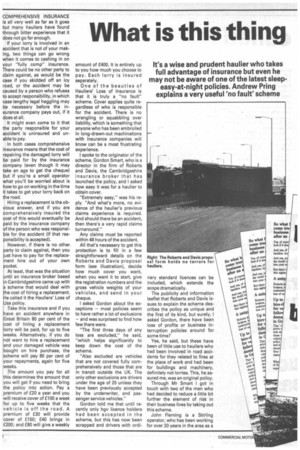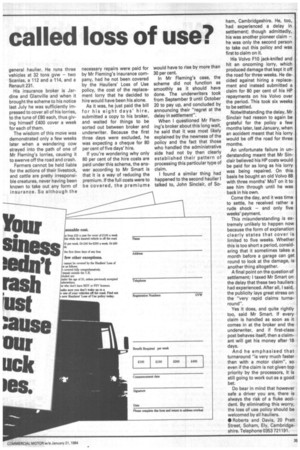What is this thing called loss of use?
Page 38

Page 39

If you've noticed an error in this article please click here to report it so we can fix it.
It's a wise and prudent haulier who takes full advantage of insurance but even he may not be aware of one of the latest sleepeasy-at-night policies. Andrew Pring explains a very useful 'no fault' scheme
COMPREHENSIVE INSURANCE is all very well as far as it goes but many hauliers have found through bitter experience that it does not go far enough.
If your lorry is involved in an accident that is not of your making, two things can go wrong when it comes to cashing in on your "fully comp" insurance. There could be no other party to claim against, as would be the case if you skidded off an icy road, or the accident may be caused by a person who refuses to accept responsibility, in which case lengthy legal haggling may be necessary before the insurance company pays out, if it does at all.
It might even come to it that the party responsible for your accident is uninsured and unable to pay.
In both cases comprehensive insurance means that the cost of repairing the damaged lorry will be paid for by the insurance company (even though it may take an age to get the cheque) but if you're a small operator what you'll be worried about is how to go on working in the time it takes to get your lorry back on the road.
Hiring a replacement is the obvious answer, and if you are comprehensively insured the cost of this would eventually be paid by the insurance company of the person who was responsible for the accident (if that responsibility is accepted).
However, if there is no other party to claim against, then you just have to pay for the replacement hire out of your own pocket.
At least, that was the situation until an insurance broker based in Cambridgeshire came up with a scheme that would deal with the cost of hiring a replacement. He called it the Hauliers' Loss of Use policy.
Take this insurance and if you have an accident anywhere in Great Britain 80 per cent of the cost of hiring a replacement lorry will be paid, for up to five weeks. Alternatively, if you do not want to hire a replacement and your damaged vehicle was bought on hire purchase, the scheme will pay 80 per cent of your repayments, again for five weeks.
The amount you pay for all this determines the amount that you will get if you need to bring the policy into action. Pay a premium of £20 a year and you will receive cover of £100 a week for up to five weeks that the vehicle is off the road. A premium of E30 will provide cover of £150; £40 brings in £200; and £80 will give a weekly amount of £400. It is entirely up to you how much you choose to pay. Each lorry is insured separately.
One of the beauties of Hauliers' Loss of Insurance is that it is truly a "no fault" scheme. Cover applies quite regardless of who is responsible for the accident. There is no wrangling or squabbling over liability, which is something that anyone who has been embroiled in long-drawn-out machinations with insurance companies will know can be a most frustrating experience.
I spoke to the originator of the scheme, Gordon Smart, who is a director in the firm of Roberts and Davis, the Cambridgeshire insurance broker that has launched the policy, and I asked how easy it was for a haulier to obtain cover.
"Extremely easy," was his reply. "And what's more, no evidence of the haulier's previous claims experience is required. And should there be an accident, then there's a very rapid claims turnaround."
Any claims must be reported within 48 hours of the accident.
All that's necessary to get this protection is to fill in a few straightforward details on the Roberts and Davis proposal form (see illustration), decide how much cover you want, when you want it to start, give the registration numbers and the gross vehicle weights of your vehicles, and send in your cheque.
I asked Gordon about the exceptions — most policies seem to have rather a lot of exclusions — and was surprised to find how few there were.
"The first three days of any loss are excluded," he said, "which helps significantly to keep down the cost of the scheme.
"Also excluded are vehicles that are not covered fully comprehensively and those that are in transit outside the UK. The only other exclusions are drivers under the age of 25 unless they have been previously accepted by the underwriter, and passenger service vehicles."
Gordon told me that until recently only hgv licence holders had been accepted in the scheme, but this has now been scrapped and drivers with ordi nary standard licences can be included, which extends the scope dramatically.
The publicity and information leaflet that Roberts and Davis issues to explain the scheme describes the policy as unique and the first of its kind, but surely, I asked Gordon, there have been loss of profits or business interruption policies around for sometime?
Yes, he said, but these have been of little use to hauliers who had been involved in road accidents for they related to fires at the place of work and had been for buildings and machinery, definitely not lorries. This, he assured me, was an original policy.
Through Mr Smart I got in touch with two of the men who had decided to reduce a little bit further the element of risk in their business lives by taking out this scheme.
John Fleming is a Stirling operator, who has been working for over 20 years in the area as a general haulier. He runs three vehicles at 32 tons gvw — two Scanias, a 112 and a 114, and a Renault 231.
His insurance broker is Jardine and Glanville and when it brought the scheme to his notice last July he was sufficiently impressed to cover all of his lorries, to the tune of £80 each, thus giving himself £400 cover a week for each of them.
The wisdom of this move was demonstrated only a few weeks later when a wandering cow strayed into the path of one of Mr Fleming's lorries, causing it to swerve off the road and crash.
Farmers cannot be held liable for the actions of their livestock, and cattle are pretty irresponsible creatures, never having been known to take out any form of insurance So although the necessary repairs were paid for by Mr Fleming's insurance company, had he not been covered by the Hauliers' Loss of Use policy, the cost of the replacement lorry that he decided to hire would have been his alone.
As it was, he just paid the bill for his eight days' hire, submitted a copy to his broker, and waited for things to be sorted out between broker and underwriter. Because the first three days were excluded, he was expecting a cheque for 80 per cent of five days' hire.
If you're wondering why only 80 per cent of the hire costs are paid under this scheme, the answer according to Mr Smart is that it is a way of reducing the premium. If the full costs were to be covered, the premiums would have to rise by more than 30 per cent.
In Mr Fleming's case, the scheme did not function as smoothly as it should have done. The underwriters took from September 9 until October 20 to pay up, and concluded by announcing their "regret at the delay in settlement".
When I questioned Mr Fleming's broker about this long wait, he said that it was most likely explained by the newness of the policy and the fact that those who handled the administrative side had not by then clearly established their pattern of processing this particular type of claim.
I found a similar thing had happened to the second haulier I talked to, John Sinclair, of So
ham, Cambridgeshire. He, too, had experienced a delay in settlement though admittedly, his was another pioneer claim — he was only the second person to take out this policy and was first to claim on it.
His Volvo F10 jack-knifed and hit an oncoming lorry, which produced damage that kept it off the road for three weeks. He decided against hiring a replacement and instead submitted a claim for 80 per cent of his HP repayments on his Volvo over the period. This took six weeks to be settled.
Notwithstanding the delay, Mr Sinclair had reason to again be grateful for the policy a few months later, last January, when an accident meant that his lorry would be off the road for three months.
An unfortunate failure in understanding meant that Mr Sinclair believed his HP costs would be paid for as long as his lorry was being repaired. On this basis he bought an old Volvo 88 with three months' MoT on it to see him through until he was back in his own.
Come the day, and it was time to settle, he received rather a rude shock — and only five weeks' payment.
This misunderstanding is extremely unlikely to happen now because the form of explanation clearly states that cover is limited to five weeks. Whether this is too short a period, considering that it sometimes takes a month before a garage can get round to look at the damage, is another thing altogether.
A final point on the question of settlement; I taxed Mr Smart on the delay that these two hauliers had experienced. After all, I said, the publicity lays great stress on the "very rapid claims turnaround".
Yes it does, and quite rightly too, said Mr Smart. If every claim is handled as soon as it comes in at the broker and the underwriter, and if first-class post behaves itself, then a claimant will get his money after 18 days.
And he emphasised that turnaround "is very much faster than with a motor claim", so even if the claim is not given top priority by the processors, it is still going to work out as a good bet.
Do bear in mind that however safe a driver you are, there is always the risk of a fluke accident. By eliminating this worry, the loss of use policy should be welcomed by all hauliers.
• Roberts and Davis, 20 Pratt Street, Soham, Ely, Cambridgeshire. Telephone 0353 721191.
















































































